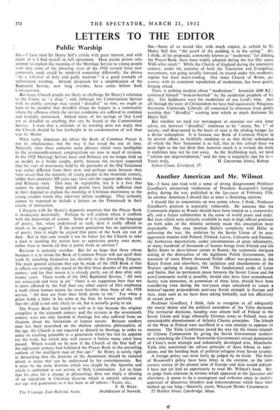SIR,—Some of us would like, with much respect, to submit
to Sir Henry Self that " the proof of the pudding is in the eating." All, I think, of his proposals, commonly known as " modernist," for diluting the Prayer-Book, have been widely adopted during the last fifty years. With what result ? While the Church of England during the nineteenth century, under the stimulus of both the Tractarian and Evangelical movements, was going steadily forward, its record under this modernist regime has been heart-rending. Our sister Church of Rome, per contra, with its consistent repudiation of modernism, has been quietly forging ahead.
There is nothing modern about " modernism." Jeremiah (600 B.C.) confessed himself " broken-hearted " by the modernist prophets of his day. The Sadducees were the modernists of our Lord's time. And all through the story of Christendom we have had successively Pelagians, Socinians, Unitarians, Liberals, all concerned to eliminate from public worship that " dreadful" warning note which so much distresses Sir Henry Self.
But whether we read cur newspapers or examine our own inner selves, sin, however " dreadful," continues to be " enemy No. 1 " of society; and deep-seated in the heart of man is the abiding hunger for a divine redemption. It is because our Book of Common Prayer in its several offices so faithfully mediates to us that divine redemption of which the New Testament is so full, that in this critical hour we must fight to the last ditch that, however much it is revised, the truth it enshrines may not be cast away. As the Archbishop says, we need " reform not impoverishment," and the time is singularly ripe for it.—


































 Previous page
Previous page